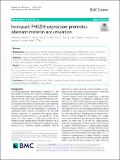| dc.contributor.author | Mattaini, Katherine R. | |
| dc.contributor.author | Sullivan, Mark R. | |
| dc.contributor.author | Lau, Allison N. | |
| dc.contributor.author | Fiske, Brian P. | |
| dc.contributor.author | Vander Heiden, Matthew G. | |
| dc.date.accessioned | 2020-04-08T14:35:03Z | |
| dc.date.available | 2020-04-08T14:35:03Z | |
| dc.date.issued | 2019-07-22 | |
| dc.identifier.issn | 1471-2407 | |
| dc.identifier.uri | https://hdl.handle.net/1721.1/124524 | |
| dc.description.abstract | Background: Copy number gain of the D-3-phosphoglycerate dehydrogenase (PHGDH) gene, which encodes the first enzyme in serine biosynthesis, is found in some human cancers including a subset of melanomas. Methods: In order to study the effect of increased PHGDH expression in tissues in vivo, we generated mice harboring a PHGDH tetO allele that allows tissue-specific, doxycycline-inducible PHGDH expression, and we analyzed the phenotype of mice with a ubiquitous increase in PHGDH expression. Results: Tissues and cells derived from PHGDH tetO mice exhibit increased serine biosynthesis. Histological examination of skin tissue from PHGDH tetO mice reveals the presence of melanin granules in early anagen hair follicles, despite the fact that melanin synthesis is closely coupled to the hair follicle cycle and does not normally begin until later in the cycle. This phenotype occurs in the absence of any global change in hair follicle cycle timing. The aberrant presence of melanin early in the hair follicle cycle following PHGDH expression is also accompanied by increased melanocyte abundance in early anagen skin. Conclusions: These data suggest increased PHGDH expression impacts normal melanocyte biology, but PHGDH expression alone is not sufficient to cause cancer. | en_US |
| dc.description.sponsorship | Koch Institute for Integrative Cancer Research (Grant (P30-CA14051) | en_US |
| dc.description.sponsorship | National Science Foundation (U.S.). Graduate Research Fellowship Program (DGE-1122374) | en_US |
| dc.description.sponsorship | Damon Runyon Cancer Research Foundation (Grant DRG-2241-15) | en_US |
| dc.description.sponsorship | Ludwig Center for Molecular Oncology at MIT (Grant 21-CA198028) | en_US |
| dc.description.sponsorship | Ludwig Center for Molecular Oncology at MIT (Grant R01-CA168653) | en_US |
| dc.language.iso | en | |
| dc.publisher | Springer Science and Business Media LLC | en_US |
| dc.relation.isversionof | 10.1186/s12885-019-5933-5 | en_US |
| dc.rights | Creative Commons Attribution 4.0 International license | en_US |
| dc.rights.uri | https://creativecommons.org/licenses/by/4.0/ | en_US |
| dc.source | BioMed Central (BMC) | en_US |
| dc.subject | Genetics | en_US |
| dc.subject | Cancer Research | en_US |
| dc.subject | Oncology | en_US |
| dc.title | Increased PHGDH expression promotes aberrant melanin accumulation | en_US |
| dc.type | Article | en_US |
| dc.identifier.citation | Mattaini, Katherine R. et al. "Increased PHGDH expression promotes aberrant melanin accumulation." BMC cancer 19 (2019): :723 © 2019 The Author(s) | en_US |
| dc.contributor.department | Massachusetts Institute of Technology. Department of Biology | en_US |
| dc.contributor.department | Koch Institute for Integrative Cancer Research at MIT | en_US |
| dc.relation.journal | BMC cancer | en_US |
| dc.eprint.version | Final published version | en_US |
| dc.type.uri | http://purl.org/eprint/type/JournalArticle | en_US |
| eprint.status | http://purl.org/eprint/status/PeerReviewed | en_US |
| dc.date.updated | 2020-01-30T16:52:48Z | |
| dspace.date.submission | 2020-01-30T16:52:50Z | |
| mit.journal.volume | 19 | en_US |
| mit.journal.issue | 1 | en_US |
| mit.license | PUBLISHER_CC | |
| mit.metadata.status | Complete | |
